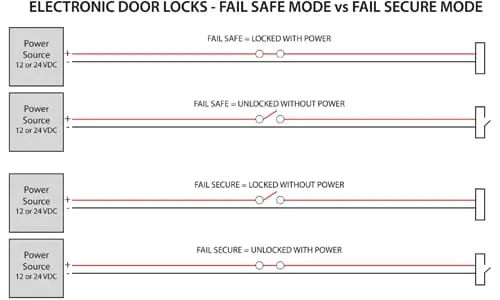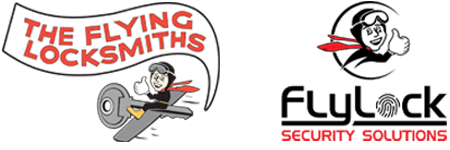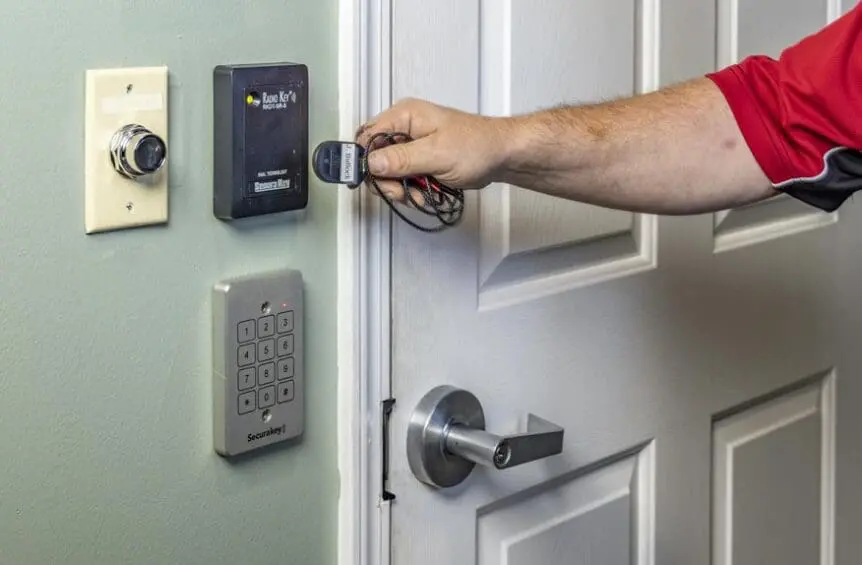What Are Fail Safe Door Locks?
Fail safe locks require constant power to remain locked and are designed to automatically unlock in the event of a power failure, fire alarm, or system malfunction. This function ensures the buildings occupants can easily exit but more importantly, that first responders to the building can quickly and easily enter in the event of an emergency, such as a fire or other disaster. Fail safe locks are typically used on doors that are required to be unlocked during an emergency, such as primary entry doors, exit doors, stairwell doors, and other egress points.
It is important to note that while fail safe locks are designed to provide maximum safety in emergency situations, they may not be ideal for securing sensitive areas or high-value assets. In the event of a power failure or other security breach, fail safe locks will be unlocked, causing the space to be vulnerable to unauthorized access.
Another thing to consider is the temperature of the lock because fail safe locks require power to stay locked. Let’s say you have an electric strike for a rim exit device so it’s surface mounted on a door frame. Since it is set to fail safe mode it has a constant stream of electricity keeping it locked, and electricity means heat. Even though it may only be 12 or 24 volts of direct current, the strike itself will be warm to mildly hot to touch. If someone leans against a failsafe electric strike on a door frame, they may not necessarily get burnt, but they will immediately feel the heat and jump away.
Along with electricity bringing additional heat, power means money, needing constant electricity to keep the hardware locked will increase your utility bill. Although it not a mass amount of electricity, constantly running power to your locks will cost more over time.
What Are Fail Secure Door Locks?
Fail secure locks do not require power to be locked and are designed to remain locked in the event of a power failure or system malfunction. This equipment ensures that unauthorized individuals cannot gain access to sensitive areas or high-value assets during an emergency or security breach. Fail secure locks are typically used for doors that require high-level security, such as server rooms, data centers, and other secure areas.
While fail secure locks provide excellent security for sensitive areas, they may not be suitable for emergency exit points or other egress doors. In the event of an emergency, the primary entrances of the building will be locked, requiring first responders to use a key to gain entry. On exterior doors with fail secure locks, it is required to have a manual key override in case of emergencies. The key needs to be in a Knox Box at the exterior entrances so the fire department can open the box to retrieve the key and enter the building.
Commercial buildings and facilities must also have proper egress devices, or exit devices, so occupants of the building can easily exit the building in an emergency.
From a wear and tear prospective, because fail secure locks are always locked, they only require a quick pulse of electricity to be unlocked. Without the need of a constant stream of electricity the components tend to last longer, and utility bills will be a little lower as you don’t have to utilize electricity to keep your doors secure.
Basic Wiring Diagram Showing How Fail Safe and Fail Secure Door Locks Work

What happens to the door locks when a building loses power?
FAIL SAFE = Door locks are UNLOCKED
FAIL SECURE = Door locks are LOCKED
Choosing the Right Type of Lock: Fail Safe vs Fail Secure
When selecting the right type of lock for your access control system, it is important to carefully consider the needs of your facility. Factors to consider include the level of security required, the types of doors that need to be secured, along with the needs of first responders and occupants in the event of an emergency.
If your facility requires high-level security for sensitive areas, fail secure locks may be the best option. However, it is important to ensure there is a manual key override, and there are adequate emergency exits and other egress points to ensure the safety of occupants in the event of an emergency or power outage.
If your facility requires fail safe locks for emergency exits, it is important to ensure that there are adequate security measures in place to prevent unauthorized access to sensitive areas or high-value assets.
Consulting with a Professional Access Control Locksmith
If you are unsure which type of lock is right for your facility or door hardware, it is important to consult with a professional access control locksmith. An experienced security system specialist knows building codes and can assess your security needs to recommend the best type of lock for your commercial access control system.
By understanding the difference between fail safe and fail secure locks, you can make an informed decision when choosing the right type of lock for your access control system. Whether you require maximum security for sensitive areas or fail-safe locks for emergency responders, a professional access control locksmith at The Flying Locksmiths can help ensure your electronic access control system provides the security and safety you need. Contact a Flying Locksmiths location near you today to learn more about our access control installation solutions and commercial locksmith services.


